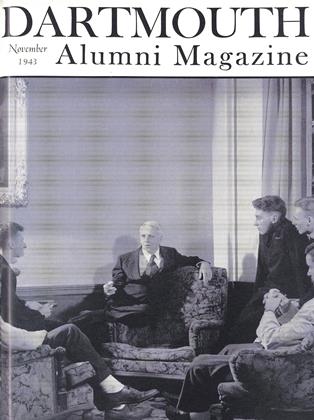MOST OF US IN THESE DAYS have at least this much in common with Shakespeare—small Latin and less Greek. "E pluribus unum" is the limit for many a man who boasts an A.8., and possibly a Phi Bete key in addition. Hence it may be necessary to supply a translation of the once well known advice of Horace"Aequam memento rebus in arduis servare mentem," which may be freely rendered, "Remember to keep a stiff upper lip when things aren't going well." Good advice, too, especially in wartime, and most especially of all when radio commentators, who seem to delight in .hanging the heavens with sables, conceive themselves to be official purveyors of gloom with intent to banish complacency from the American mind. The greatest fear manifested by official Washington has been lest we, the American public, assume that the United Nations have practically got the war won, with the lamentable effect of slackening our war effort. That this may not happen, a pessimistic chorus has gone broadcast from many microphones; and the intimation is that anything that looks like a victory for our side ought to be played down as something unimportant.
From that sad period we seem at last to be emerging, even though the most any topnotch radio commentator seems ready to admit is that we've reached the penumbra, where things aren't so totally black as they were a year ago. The idea remains the same—keep people aware that the war isn't won yet and that it is necessary that all Americans be on their toes all the time, without falling into apathetic notions that all's over but the shouting. A gradation of shade is to be noted. They aren't telling us that we may lose the war—and very likely will. It is only insisted that, while we are going to win, we haven't won yet—and that the thing to be most afraid of now is that we shall lose the peace.
This is a welcome change, but even so the tendency crops out occasionally to play on our fears. One admiral talks depressingly of preparations to fight a nine years' war with Japan—not that he has any idea it will take as long as that, really, though that is pretty sure to be the interpretation of the careless reader. What is in mind is the old dread that people will think, in the cant phrase, that "it's in the bag." From the start, the curious idea has prevailed that the best way to pep up the public's morale is to keep people crying.
We have come a long way from the Jingo bluster which insisted that Uncle Sam could lick all creation with one hand tied behind him—and that's all to the good, of course. The question is whether or not we have gone too far to the other extreme, making things look as hopeless as possible. One highly placed naval authority went so far on one occasion as to say, "We aren't winning this war; we are losing it—periodl" Query whether that's the sort of stuff to feed the troops—or the civilians, either. In
any case, "Aequam memento rebus in arduis servare mentem!" That ardent blue stocking of renaissance days, Isabella d'Este, chose a good motto for her book-plate. It was "Nec spe, nec metu." To venture a free translation again, "Be not elated by hope, nor yet cast down by fear." Grant us in all things to preserve an even mind!
 View Full Issue
View Full Issue
More From This Issue
-
 Article
ArticleROBERT FROST RETURNS
November 1943 By CHARLES G. BOLTE '41 -
 Article
ArticleWILLIAM JEWETT TUCKER
November 1943 By ALEXANDER LAING '25 -
 Lettter from the Editor
Lettter from the EditorLetters from Dartmouth Men in the Armed Forces
November 1943 -
 Class Notes
Class Notes1918
November 1943 By ERNEST H. EARLEY, DONALD L. BARR -
 Class Notes
Class Notes1937
November 1943 By JOHN H. DEVLIN JR., FRANCIS T. FENN, JR. -
 Class Notes
Class Notes1917
November 1943 By MOTT D. BROWN JR., DONALD BROOKS
P. S. M.
Article
-
 Article
ArticleMasthead
January, 1930 -
 Article
ArticleMILESTONES
APRIL 1932 -
 Article
ArticleFirst Ascent of Mt. Washington
November 1942 -
 Article
ArticleCollege Delegates
July 1948 -
 Article
ArticleThe Protection of Student Health
October 1936 By DEAN LLOYD K. NEIDLINGER '23 -
 Article
ArticleNotes from the Seventies
November 1935 By E. G. Kimball '81








